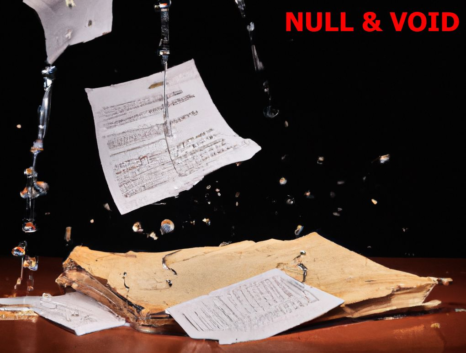Debates recogidos en el Foro «Música y Cultura (M&C)».
Categoría: Debates

(Español)
«En la España actual, circulan mitos y fábulas que muy a menudo pasamos por alto. Algunos de estos mitos se relacionan con la supuesta legitimidad de la Constitución española y la democracia representativa. Sin embargo, al analizar las normas internacionales, la historia y el propio razonamiento lógico, surgen preguntas. Las principales son si esta Constitución realmente tiene plena legitimidad y si la representatividad existe.
Insisto. Este par de claros ejemplos de falacias legales y sociales están en:
1.- la propia supuesta legitimidad de la Constitución española que, en la realidad, sin embargo, teniendo en cuenta las normas internacionales e históricas en las que se instituyó y, sobre todo, la propia lógica, sería una norma nula de pleno derecho a ese respecto.
2.- la propia supuesta representatividad ciudadana del sistema de partidos, así como que el ciudadano pueda controlar los poderes del estado a través de éstos.
Como siempre, no voy a pedir que me crean. Prefiero exponer algunos de los hechos concretos que, con el tiempo, me llevaron a esta convicción basada en evidencia sólida.
Hace muchos años hice también un artículo en otro medio analizando las raíces históricas de todo esto. Pero para no alargar demasiado este artículo antes de la encuesta, partiré del principio fundamental de la Revolución Francesa y Americana. Es decir, los tres poderes del Estado, legislativo, ejecutivo y judicial, deben estar al servicio del pueblo. Y es al pueblo a quien corresponde por Derecho el Poder Legislativo. Pertenece a quien va a sufrir su propio trabajo, garantizando así que lo hará por ello lo mejor posible.
MEOLLO
Para que dicho poder se ejerza correctamente, antes de que llegarse al texto constitucional ha de haber un periodo constituyente. Un tiempo en el que el propio pueblo español, disfrutando de libertad colectiva, se establezca como colectivo constituyente. Todo para definir cómo quiere la ciudadanía que sea esa norma constitutiva de su propio Derecho Fundador.
Para que una norma sea «constitución» hace falta que cumpla con unos requisitos básicos: no cualquier cosa es una «constitución». Requisitos que las constituciones europeas históricas por excelencia, posteriores a dichas revoluciones francesa y americana, respetaban. Son básicos siempre porque son garantes de la estabilidad y tranquilidad que se deriva de la lógica de la legitimidad.
Uno de los más elementales y básicos que son conditio sine qua non es la división de poderes. Es decir, división de poderes que se constituyen intervigilantes del cumplimiento constitucional entre ellos. Y algo que se sigue y deriva inmediata y concomitante de ello es el control desde Poder Legislativo. Tiene que poder fiscalizar y vigilar que los poderes ejecutivo y judicial cumplen su trabajo tal como el legislativo definió.
Esto es en extremo importante. Uno de los principios de la democracia llamada representativa es que los ciudadanos puedan ser representados real, eficaz y efectivamente por el o los diputados que ellos decidan libremente. Y a la vez se ha de garantizar en cada representante que lo que los ciudadanos determinan es llevado a la cámara y tenido en cuenta eficientemente según la ley.
Y si el diputado o grupo de diputados comisionados para esa labor de representación no la realizan o la realizan defectuosamente son despedidos automáticamente al día siguiente de demostrarse, sin esperar a ningún otro plazo. Todo ello con el fin de ejercer ese poder de control que necesariamente tiene que tener el poder legislativo. Poder que ha de constituirlo la ciudadanía para que pueda haber una democracia.
Originalmente se instituyó la representatividad aduciendo que no cabían todos en el edificio donde se deciden las cosas públicas del país. Actualmente esto es falso, porque hay medios técnicos que pueden garantizar dicha participación colectiva e incluso colegiada sin necesidad de estar todos físicamente en una misma sala. Pero eso sería tema de otro artículo.
En suma, es decir, sin este mecanismo de control del poder legislativo, y también ultérrima y originalmente de los ciudadanos constituyentes, no hay ni puede existir democracia y mucho menos democracia representativa.
FINAL
Pues bien, tengamos en cuenta que
1.- desde el punto de vista de la legitimidad constituyente, lo que tenemos es una constitución nula de pleno derecho. Y, en el mejor caso, una especie de ley orgánica pergeñada y pertrechada directamente en época del anterior dictador. Una norma puesta en marcha por los poderes fácticos desde el sistema franquista. Activados para evitar que pudiera haber el imprescindible periodo constituyente realizado por quienes lo detentamos, el pueblo español. De todos es sabido que Franco no quería que los españoles le chafáramos los planes pudiendo elegir por nosotros mismos. Y se aducía que como no teníamos experiencia éramos como niños a los que había que cuidar.
Y tengamos también en cuenta que
2.- de lo anteriormente explicado, no existe ni puede existir democracia ni democracia representativa en el sistema. Un sistema instituído desde la propia ley franquista sin periodo constituyente real. No podemos elegir libremente qué persona o personas físicas queremos que nos representen. Esto es evidente. Vienen pre-dadas y depredadas en un pack prefijado que establece el jefe del partido que sea, que es quien elige nuestros representantes, no nosotros. Representantes que ni nos representan ni pueden representarnos porque las normas de los partidos a los que se deben se lo impiden. Y no podemos por ello garantizar la obligatoria e imprescindible independencia de poderes.
ENCUESTA
Así pues, solicito desde este humilde blog que alguien me explique de un modo demostrativo, con hechos,
1.- cómo podemos, en el presente y real estado de cosas, controlar y fiscalizar en todos los sentidos a los poderes del estado para poder hacer que el funcionamiento de nuestra democracia al menos parezca constitucional. Recuérdese que no existe en la mal llamada constitución ninguna norma que permita que los españoles tomen decisiones sobre su futuro. Porque el articulo 92 es potestad del presidente del gobierno. Y la iniciativa legislativa popular es controlada por el gobierno con la propaganda gubernamental. Y con la posibilidad de veto total del presidente del gobierno, tal como reza en la mal llamada constitución.
2.- o cómo podemos salir eficiente y pacíficamente de este secuestro patente con apariencia falsa de legalidad en el que nos encontramos desde hace más de 40 años. Y así iniciar un periodo constituyente de verdad que, al menos, nos encamine a una verdadera y entonces existente democracia.
Las respuestas en los comentarios. Muchas gracias de antemano.»
[Agustín Barahona]
(English)
In contemporary Spain, myths and fables often circulate unnoticed. Some of these myths are related to the alleged legitimacy of the Spanish Constitution and representative democracy. However, when we analyze international norms, history, and logical reasoning, questions arise. The main ones being whether this Constitution truly possesses full legitimacy and whether representativeness exists.
I emphasize this. These two clear examples of legal and social fallacies are as follows:
1.- The supposed legitimacy of the Spanish Constitution, in reality, considering international and historical norms, and above all, logic, would be null and void in this regard.
2.- The supposed citizen representativeness of the party system, as well as the citizen’s ability to control the state’s powers through them.
As always, I won’t ask you to believe me. I prefer to present some concrete facts that, over time, led me to this conviction based on solid evidence.
Many years ago, I also wrote an article in another publication, analyzing the historical roots of all this. But to keep this article from becoming too long before the survey, I will start with the fundamental principle of the French and American Revolutions. That is, the three branches of government—legislative, executive, and judicial—must serve the people. It is the people who have the rightful claim to the Legislative Power. It belongs to those who will directly bear the consequences of their work, thus ensuring they do it to the best of their ability.
CRUX
For this power to be exercised correctly, there must be a constituent period before reaching the constitutional text. A time in which the Spanish people, enjoying collective freedom, establish themselves as a constituent body. All of this to define how the citizenry wants its constitutive norm of its foundational rights to be.
For a norm to be a «constitution,» it must meet some basic requirements: not just anything can be a «constitution.» These requirements were fundamentally respected by the historic European constitutions, following the French and American revolutions. They are basic because they guarantee the stability and tranquility derived from the logic of legitimacy.
One of the most elementary and basic ones, a conditio sine qua non, is the separation of powers. That is, the division of powers that serve as mutual overseers of constitutional compliance among them. And something that follows directly and concomitantly from this is the control from the Legislative Power. It must be able to oversee and monitor that the executive and judicial powers perform their duties as defined by the legislature.
This is extremely important. One of the principles of representative democracy is that the nation’s people, its citizens, can be genuinely, effectively, and efficiently represented by the freely chosen deputies. And at the same time, it must be ensured that what citizens decide is taken to the chamber and efficiently considered according to the law. If the deputy or group of deputies appointed for this representation fail to perform or perform it defectively, they are automatically dismissed the day after it is proven, without waiting for any other deadline. All of this is to exercise the necessary control power that the Legislative Power must have. A power that must be established by the citizenry for there to be democracy.
Originally, representativeness was established, arguing that not everyone could fit in the building where public matters of the country are decided. Currently, this is false because there are technical means that can guarantee such collective and even collegiate participation without everyone needing to be physically present in the same room. But that would be the subject of another article.
In summary, that is, without this mechanism of control over the Legislative Power, and also ultimately and originally of the constituent citizens, there is no and cannot be democracy, much less representative democracy.
FINAL
Well, let’s consider that:
1.- From the perspective of constituent legitimacy, what we have is not really a constitution. It would be null and void. At best, it’s a kind of organic law devised and equipped directly during the era of the former dictator. A norm set in motion by the actual powers from the Francoist system. Activated to prevent the essential constituent period from being carried out by those of us who hold it, the Spanish people. It is widely known that Franco did not want us Spaniards to thwart his plans by choosing for ourselves. It was argued that, as we lacked experience, we were like children who needed to be taken care of.
And let’s also consider that:
2.- Based on what has been explained earlier, there is neither democracy nor representative democracy in the system. It’s a system established by the Francoist law itself without a real constituent period. We cannot freely choose which person or individuals we want to represent us. This is evident. They come predetermined and preselected as a pre-packaged deal set by the party leader, who is the one choosing our representatives, not us. Representatives who neither represent us nor can they represent us because the party rules they adhere to prevent them. As a result, we cannot guarantee the mandatory and essential separation of powers.
SURVEY
So, I request from this humble blog that someone explains demonstratively, with facts:
1.- How can we, in the current state of affairs, control and oversee the state powers in every sense to make the functioning of our democracy at least appear constitutional? Recall that there is no provision in the so-called constitution that allows Spaniards to make decisions about their future. This is because Article 92 is within the purview of the President of the Government. And popular legislative initiative is controlled by the government through governmental propaganda. Plus, it has the potential for total veto by the President of the Government, as stated in the so-called constitution.
2.- Or how can we efficiently and peacefully break free from this blatant and falsely legal hostage situation we’ve been in for over 40 years? Then initiate a real constituent period that, at the very least, sets us on a path toward a genuine and existing democracy.
The answers in the comments. Thank you very much in advance.»
[Agustín Barahona]


(Español)
¿Cuántos años de cárcel e inhabilitación creéis que merece el/la director/a de un conservatorio que, demostrablemente, no sólo no cumple ni hace cumplir las normas sino que se une clientelarmente con su equipo directivo y un grupo de profesores, todos ellos funcionarios y autoridades en el ejercicio de sus funciones, para dejar de perseguir los delitos que el propio conservatorio comete y acusar falsamente al profesor que denuncia dichos delitos para intentar así, muy deshonesta, torpe y analfabetamente, quitárselo de en medio y, mientras la administración les sigue el juego a esos delincuentes, pretender dejar al profesor sin empleo y sueldo medio año?
(English)
How many years of imprisonment and disqualification do you believe the director of a conservatory deserves not only for, demonstrably, not complying with or enforcing the rules, but also for colluding with the management team and a group of teachers, all of them civil servants and authorities in the exercise of their functions, to stop pursuing the crimes committed by the conservatory itself and falsely accuse the teacher who reports those crimes in an attempt, very dishonestly, clumsily and illiterately, to get rid of him, and while the administration plays along with those criminals, try to leave the teacher without employment and income for half a year?
Otras diversas lecturas interesantes de temática parecida:

«A través de los años vengo observando que la mayoría de la gente no sabe lo que es un debate. No conocerse las reglas de los debates e intentar participar en lo que uno cree que es un debate sería como no conocerse las reglas de movimiento de piezas del ajedrez y querer participar en lo que esa persona creyera que es ajedrez.
Fijémonos en esta reflexión sólo en el par de elementos más esenciales y básicos: título y ponencia de tema. Dos entre decenas que siempre hay que tener en cuenta.
Si en un debate no se responde a ***lo planteado por el ponente*** no se está debatiendo. En las redes sociales o internet no se puede simplemente ver una pregunta-titular en mayúsculas y responderla, como quien lee el titular de un artículo científico o periodístico sin haber leído el texto, porque más del 95% de las veces es probable que se meta la pata, porque el titular no sea lo que parece.
Veo que falta mucha cultura de debate real. Veo que la gente tiende a llamar debate a expresar cualquier cosa que piense sobre un determinado tema. Eso muestra con absoluta claridad no saber qué es un debate real; no saber cómo debate, por ejemplo, la ciencia en diferido a través de sus publicaciones, modelo de debate escrito por antonomasia.
La cuestión de cabecera –el título en realidad, sea o no interrogado– siempre es el resumen del tema del debate y lo que ha de debatirse siempre se hace ***contra*** la ponencia del ponente que lo abre, si es que es necesario decir algo porque pensemos que podemos demostrar que la ponencia es incorrecta. De otro modo no es necesario participar. Así que cualquier opinión que se haya dado que no tenga nada que ver con lo expuesto por el ponente no sirve para nada al debate en cuestión, porque lo que realmente se plantea en el debate es la idea del ponente resumida en el título-tema, entidad ésta no siempre directamente inteligible sin el propio contexto de la ponencia que representa, y que constituye el verdadero tema del debate.
Y escribir para que no sirva para nada no tiene ningún sentido. La mayoría de las veces se parece a aquél al que tras haberle preguntado otra persona qué hora es le responde «no, gracias, no fumo», sólo porque, por ejemplo, quería presumir, a como diera lugar, de que había superado el tabaquismo, fuera o no pertinente o coherente decirlo en ese momento y situación.
El formato de debate, en ausencia de un conocimiento real de cómo son los debates reales y en ausencia de la necesaria práctica añeja para poder hacerlos valer, se convierte no sólo en algo completamente estéril sino especialmente contraproducente, porque aumenta la carga de animadversión contra los que tienen razón, como puede comprobarse en las redes sociales por todas partes.
En ausencia de gente preparada para debatir, y a la espera de ello, es infinitamente mejor, por una parte, educarla en el debate lógico y formalmente correcto y eficiente así como, por otra parte, simultáneamente crear bases de datos públicas que respondan adecuadamente a todas las barbaridades, falsedades, burradas, manipulaciones, malentendidos, etc. con que se inflige y aflige a la sociedad y publicitar en todas partes su existencia, de modo que cualquiera que quiera estudiarlas y usar después sus contenidos pueda hacerlo en favor de una mejor y más didáctica difusión de la realidad conocida y del conocimiento científico, así como de sus reales y eficientes métodos.
[Agustín Barahona]